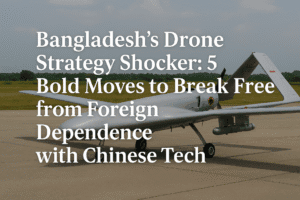Bangladesh’s Drone Strategy Shocker: 5 Bold Moves to Break Free from Foreign Dependence with Chinese Tech
Seeking to bolster defense autonomy, Bangladesh is pursuing Chinese expertise to domestically produce drones and anti-drone systems, revealed by a high-level Army delegation’s recent talks with China’s Fushan Electronic Technology. This push complements Dhaka’s existing use of Turkish Bayraktar TB-2 drones—deployed for border surveillance and capable of 27-hour missions—while reducing reliance on foreign imports.
The move aligns with Bangladesh’s “Forces Goal 2030” to modernize its military, particularly as it prepares for potential U.S.-backed operations in Myanmar’s Rakhine State, where drones could enhance counterinsurgency and border security. Concurrently, intelligence chief Major General Jahangir Alam’s discreet meetings with Turkish officials highlight efforts to diversify partnerships, balancing advanced Turkish strike capabilities with China’s cost-effective tech transfer model.
Regional tensions simmer as India monitors Bangladesh’s drone activity near shared borders, and Myanmar’s escalating conflicts heighten demand for anti-drone defenses. Challenges remain in adapting foreign technology locally and navigating geopolitical pressures, but Bangladesh’s strategy underscores a calculated bid for tactical independence in an increasingly drone-dominated security landscape.

Bangladesh’s Drone Strategy Shocker: 5 Bold Moves to Break Free from Foreign Dependence with Chinese Tech
As Bangladesh positions itself for a potential role in U.S.-backed operations in Myanmar’s Rakhine State, its military is aggressively diversifying defense partnerships to achieve technological self-reliance. A high-level delegation’s recent visit to China underscores this pivot, signaling Dhaka’s ambition to reduce dependency on foreign-made drones and counter emerging aerial threats through indigenous systems.
The China Gambit: Securing Tech Transfer for Homegrown Drones
A restricted April 10 order reveals that a five-member Bangladesh Army team, led by Major General I.K.M. Mostasehnul Baqi, engaged with China’s Fushan Electronic Technology Ltd. to negotiate transfers of unmanned aerial vehicle (UAV) and anti-drone technology. The goal is clear: leverage Chinese expertise to develop AI-enabled drones and counter-UAV systems domestically. This move aligns with Bangladesh’s broader “Forces Goal 2030” modernization plan, which prioritizes self-sufficiency in defense manufacturing.
Notably, Bangladesh already operates Turkish Bayraktar TB-2 drones—renowned for their 27-hour endurance and combat success in Ukraine—deployed along the India-Bangladesh border since late 2024. However, reliance on imports leaves Dhaka vulnerable to geopolitical pressures and supply chain disruptions. By acquiring Chinese know-how, Bangladesh aims to tailor UAVs to local needs, such as prolonged surveillance in the Sundarbans’ dense terrain or rapid response in Rohingya refugee zones.
Turkey Ties and Intelligence Diplomacy
Parallel to the China outreach, Bangladesh’s intelligence chief Major General Jahangir Alam recently met Turkey’s National Intelligence Organization head in Spain, discussing expanded military cooperation. While Ankara’s advanced drones (like the Akıncı and Anka series) remain attractive, Dhaka appears cautious about over-reliance on a single supplier. The dual-track approach—deepening ties with both Turkey and China—reflects a pragmatic strategy to diversify sources while absorbing varied technological strengths.
Regional Security Calculus
Bangladesh’s drone advancements carry geopolitical ripple effects:
- Myanmar Operations: Indigenous drones could enhance surveillance and precision strikes in Rakhine State, where Bangladesh faces cross-border militant threats.
- India’s Watchful Eye: New Delhi has monitored Bangladesh’s Turkish drone activity near Meghalaya, including 20-hour sorties exceeding typical patrol patterns. While not overtly confrontational, India may reassess border security protocols as Dhaka’s capabilities grow.
- Anti-Drone Imperatives: With Myanmar’s junta and regional non-state actors increasingly using low-cost drones, Bangladesh’s pursuit of Chinese counter-UAV tech highlights a proactive stance against asymmetric threats.
Challenges Ahead
Technology transfer deals often face hurdles, including export controls, adaptation to local infrastructure, and cybersecurity risks linked to Chinese systems. Additionally, balancing relations with competing powers (China, Turkey, and the U.S.) requires deft diplomacy to avoid alienating partners.
You must be logged in to post a comment.